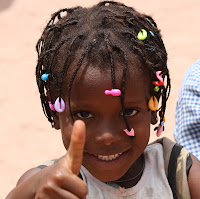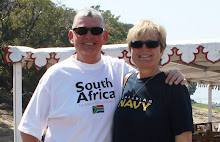 The almost schizophrenic carving up of the continent by the colonial European powers in their day has resulted in the boundaries of the many countries that make up modern Africa. So, I suppose I can be forgiven for knowing next to nothing about The Gambia - the smallest country on mainland Africa. It looks like a finger jutting into Senegal, which shares its other borders. Gambia's own boundaries mirror the meandering Gambia River - a River that was of strategic importance during the infamous slave trade.
The almost schizophrenic carving up of the continent by the colonial European powers in their day has resulted in the boundaries of the many countries that make up modern Africa. So, I suppose I can be forgiven for knowing next to nothing about The Gambia - the smallest country on mainland Africa. It looks like a finger jutting into Senegal, which shares its other borders. Gambia's own boundaries mirror the meandering Gambia River - a River that was of strategic importance during the infamous slave trade. Beyond the dock gates, container traffic vied for position on the potholed dirt road leading out of the port while the craft marketeers gathered in full force, ready to set up shop on the dock once the port authorities gave the OK.

The most striking thing was the colour. The women's costumes and headdresses were so vibrant and many were wearing beautiful necklaces and earrings.
Our mode of transportation was somewhat unique - described as "an open-sided four wheel drive that seats about 20 people" - the old converted army truck with its broken seats and thatched roof trundled down the road, throwing us this way and that as yet another pothole was negotiated.
 Leaving the town, the road turned into a winding track and the countryside looked desolate. It was still the dry season and the rains were not due for another couple of months. Enormous termite hills flanked the roadway together with various vegetation.
Leaving the town, the road turned into a winding track and the countryside looked desolate. It was still the dry season and the rains were not due for another couple of months. Enormous termite hills flanked the roadway together with various vegetation.Now and again we would brush against lime and cashew trees as we lurched from side to side over the uneven track. Dust clouded around us as another pothole was missed and errant branches thrashed the side of the vehicle, some dropping their leaves and fruit on us as we ducked to avoid a direct hit.


The men didn't appear to be particularly motivated. The large numbers of children that ran out to wave and yell wildly when they heard our vehicle coming was astonishing.
Returning to Banjul we followed a coastal road, passing a fishing community. The stench of raw fish was strong as well as a more fragrant smell coming from the peanut processing plant, Gambia's predominant export earner.
And then the scene would have been perfect, underscored by those haunting Banjul eyes.







No comments:
Post a Comment